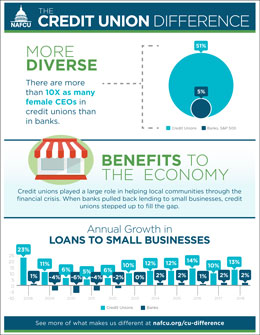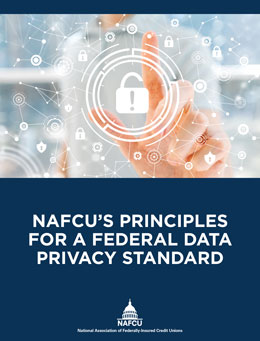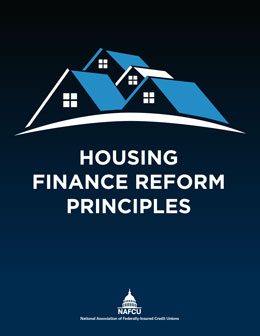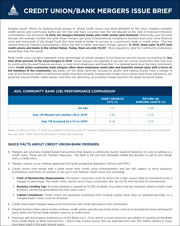Personally make an impact in developing key credit union legislation and regulation.
Harmful regulatory burdens continue to squeeze credit unions’ ability to offer products and services for nearly 120 million members. You’re the best possible advocate. Share your story on Capitol Hill. Help Congress understand where credit unions stand on these key issues.
Browse top credit union advocacy issues below and download resources to share with Congress.
Jump to: CU Difference | Data Privacy & Security | BSA/AML Reform | Financial Technology | Housing Finance Reform | Loan Maturity Limits | Marijuana Banking | Mergers: Credit Unions and Community Banks
CU Difference
 Credit unions make America STRONGER
Credit unions make America STRONGER
NAFCU believes that credit unions are the best financial services option for consumers. Period. We urge you to share what makes credit unions so wonderful from being more diverse in leadership and communities served, to contributing to a strong economy for consumers and businesses alike.
Download the one-page CU Difference infographic
View the full CU Difference infographic
Data Privacy & Security
 Support legislation to create a national data privacy and security standard
Support legislation to create a national data privacy and security standard
Data security and data privacy go hand-in-hand. Join us in pressing lawmakers to create a strong federal data safekeeping standard for retailers and in advocating for a comprehensive federal data privacy standard that protects consumers, harmonizes existing federal data privacy laws, and preempts state privacy laws. NAFCU was the first financial services trade association to weigh in on data security on Capitol Hill in the wake of the Target data security breach, and we haven’t stopped since. In recent years, a number of states have started enacting their own laws on data security and data privacy. In light of the mounting uncertainty and escalating compliance burdens for credit unions, the need for federal privacy legislation is clear. That’s why last year, NAFCU unveiled its Principles for a Federal Data Privacy Standard.
BSA/AML/Beneficial Ownership Reform
 Support legislation to modernize and improve BSA/AML/Beneficial Ownership requirements
Support legislation to modernize and improve BSA/AML/Beneficial Ownership requirements
Last year, the House passed bipartisan legislation to help modernize Bank Secrecy Act/Anti-Money Laundering requirements. The same legislation also sought to help financial institutions in identifying the beneficial owner of entities they deal with. The bipartisan legislation, S. 2563, the ILLICIT CASH Act, is pending in the Senate. Your advocacy on the need to reform and modernize the BSA/AML regime and the impact it will have on your credit union will help Congress understand the need to enact this legislation.
Financial Technology
 Encourage regulatory coordination between traditional financial institutions and fintech companies
Encourage regulatory coordination between traditional financial institutions and fintech companies
As the financial industry sees the entrance of more technology to support its services and products and tech companies seeking to provide financial services to consumers, NAFCU developed a white paper to chart a path towards regulatory coordination between traditional financial institutions and fintech companies. NAFCU is active in the fintech landscape: The association has worked closely with the Federal Reserve and other stakeholders on making the U.S. payments system faster and more secure, and is also a member of two blockchain consortia to give credit unions direct access to use cases being developed.
Download NAFCU's Fintech white paper
Housing Finance Reform
 Advocate for equal access to the secondary mortgage market for credit unions
Advocate for equal access to the secondary mortgage market for credit unions
Debate continues in Congress about the future of housing finance reform. The secondary mortgage market is critical for credit unions in managing interest rate risk and facilitating the flow of mortgage credit to their members. Credit unions are an important part of the mortgage market and shouldn’t, under any circumstances, be shut out by larger players. Given the complex nature of the housing finance market, lawmakers need your immense expertise and insight as a lender.
Download NAFCU's Housing Finance Reform Principles
Loan Maturity Limits
 Support legislation for longer maturity limits and give credit unions additional tools to grow
Support legislation for longer maturity limits and give credit unions additional tools to grow
NAFCU has long advocated for credit unions to have flexibility with respect to loan maturity limits. The current 15-year limit on certain loans is outdated and does not conform to maturities that are commonly accepted in the market today. In March, House Financial Services Committee members Lee Zeldin, R-N.Y., and Vicente Gonzalez, D-Texas, introduced NAFCU-supported legislation, H.R. 1661, which would give the NCUA greater flexibility in setting loan maturity limits under the Federal Credit Union Act. Your advocacy helps Congress understand why longer limits are crucial to your members.
Marijuana Banking
 Advocate for clear legislation
Advocate for clear legislation
While NAFCU has not and will not take a position on the legalization or decriminalization of marijuana, the association has a number of resources on the issue and continues to encourage Congress to consider legislative complexities as several states have legalized the drug.
Mergers: Credit Unions and Community Banks
 Set the record straight on credit union-bank mergers
Set the record straight on credit union-bank mergers
NAFCU President and CEO Dan Berger, in a letter to Treasury Secretary Steven Mnuchin, provided insights into recent credit union-bank mergers. "The mergers in question are voluntary, market-based transactions and the community banks' board of directors are voting to sell to credit unions as the best option available for consumers," Berger said, echoing comments from NCUA Chairman Rodney Hood in congressional testimony. Credit union-bank mergers are significantly smaller than the recent mergers between banks. For example, the BB&T Corp. and SunTrust Bank merger created the sixth largest retail bank in the country, with $435 billion in assets. Credit unions are also leading banks when it comes to diversity and inclusion efforts, as well as satisfaction among consumers.
Additional Resources
- View NAFCU'S 2020 advocacy priorities and browse more advocacy issues.
- Download NAFCU's legislation tracker to see NAFCU's stance on key legislation impacting credit unions.
- Attend NAFCU's Congressional Caucus to support credit unions at the industry's more intimate advocacy event. September 13-16, 2020 on Capitol Hill.
- Visit our Grassroots Action Center to take action, track bills, find your legislator and more.
